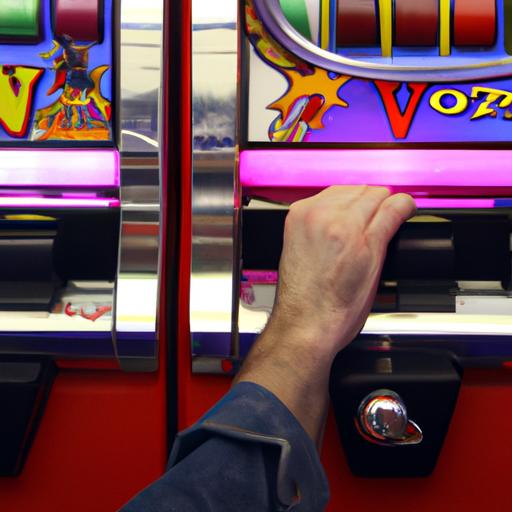Why Slot Machines Are Addictive: Understanding the Science Behind the Addiction
Slot machines are a popular form of entertainment that has been around for decades. Many people enjoy the thrill of spinning the reels and hoping to hit the jackpot. However, for some individuals, playing slot machines can become an addiction that negatively impacts their lives. In this article, we will explore the science behind why slot machines are addictive and the impact of this addiction on individuals.
Slot machines are electronic devices that provide gambling games to players. Players insert money into the machine and press a button or pull a lever to spin the reels. The reels contain symbols, and if the symbols match up on the payline, the player wins a prize. Slot machines are designed to be easy to play, and the outcome of each spin is determined by a random number generator, making it impossible to predict the outcome.
Addiction is a complex condition that involves compulsive behavior, continued use despite negative consequences, and a lack of control over the behavior. Addiction can be caused by a variety of factors, including genetics, environment, and brain chemistry. In the case of slot machine addiction, the behavior is compulsive, and individuals continue to play despite negative consequences, such as financial ruin and relationship problems.
The thesis of this article is to explore the science behind why slot machines are addictive and the impact of this addiction on individuals. Understanding the science behind addiction can help individuals recognize the signs of addiction and seek help before it’s too late.
Understanding Slot Machines

Slot machines are one of the most popular forms of gambling worldwide, with millions of people playing them every day. Understanding how slot machines work is essential to understanding why they are so addictive.
A. How Slot Machines Work
Slot machines use a random number generator (RNG) to determine the outcome of each spin. The RNG is a computer program that generates random numbers, which correspond to the symbols on the slot machine’s reels. When a player presses the spin button, the RNG selects a random number for each reel, and the reels spin to display the corresponding symbols. If the symbols match up on the payline, the player wins a prize.
Modern slot machines are often digital and use touchscreens instead of physical reels. However, the basic principle of the RNG remains the same. Each spin is independent of the previous spin, and the outcome is entirely random.
B. Types of Slot Machines
There are several types of slot machines, each with its own unique features and gameplay. Some of the most popular types of slot machines include:
- Classic Slots: These are traditional slot machines with three reels and a single payline.
- Video Slots: These are modern slot machines with five or more reels and multiple paylines. They often feature advanced graphics, animations, and bonus rounds.
- Progressive Slots: These are slot machines that are linked together to form a network. A portion of each bet is added to a progressive jackpot, which can be won by any player on the network.
C. The Psychology Behind Slot Machines
Slot machines are designed to be addictive, and many factors contribute to this addiction. One of the most significant factors is the “near-miss” effect. This effect occurs when a player comes close to winning but falls just short. The player perceives this as a win and is more likely to continue playing in the hopes of winning next time.
Another factor that contributes to the addiction is the variable reinforcement schedule. Slot machines provide intermittent reinforcement, meaning that the player does not win every time they play. This type of reinforcement is more powerful than a constant reinforcement schedule and leads to compulsive behavior.
In the next section, we will explore the addiction cycle and how it applies to slot machines.
The Addiction Cycle

Addiction is a cycle that involves three stages: binge/intoxication, withdrawal/negative affect, and preoccupation/anticipation. The binge/intoxication stage is characterized by the pleasure of engaging in the addictive behavior, such as playing slot machines. The withdrawal/negative affect stage involves negative emotions, such as anxiety and depression, when the behavior is not being engaged in. The preoccupation/anticipation stage involves the individual constantly thinking about the addictive behavior and planning when they can engage in it next.
When it comes to slot machine addiction, the addiction cycle is no different. The binge/intoxication stage is when the individual experiences the pleasure of playing the slot machine and the excitement of possibly winning. The withdrawal/negative affect stage occurs when the individual is not playing the slot machine and experiences negative emotions, such as anxiety and depression. The preoccupation/anticipation stage involves the individual constantly thinking about the slot machine and planning when they can play next.
Dopamine is a neurotransmitter that is released in the brain when individuals engage in pleasurable activities, such as gambling. Dopamine is responsible for the pleasurable feelings associated with gambling and is also involved in the addiction cycle. The release of dopamine in the brain leads to the reinforcement of the addictive behavior and can make it difficult for individuals to stop engaging in the behavior. This reinforcement can lead to the development of addiction and the cycle of compulsive behavior.
The Science of Addiction
Addiction is a complex condition that involves changes in the brain’s reward system. When a person engages in pleasurable activities, such as eating or playing video games, the brain releases a neurotransmitter called dopamine, which creates a feeling of pleasure and reinforces the behavior. Over time, the brain becomes desensitized to dopamine, and more of the substance is needed to achieve the same level of pleasure.
How addiction affects the brain
When a person becomes addicted to a substance or behavior, the brain undergoes significant changes. The brain’s reward system becomes rewired, and the behavior becomes compulsive, making it difficult to control. The prefrontal cortex, which is responsible for decision-making and impulse control, becomes weakened, making it harder for individuals to resist the urge to engage in the addictive behavior.
Neurotransmitters involved in addiction
Several neurotransmitters are involved in addiction, including dopamine, serotonin, and norepinephrine. Dopamine is the primary neurotransmitter involved in the brain’s reward system and is responsible for creating feelings of pleasure. Serotonin and norepinephrine are involved in regulating mood and stress, and imbalances in these neurotransmitters can lead to addiction.
The role of genetics in addiction
Genetics plays a significant role in addiction. Studies have shown that individuals with a family history of addiction are more likely to develop an addiction themselves. Researchers have identified specific genes that may be involved in addiction, such as those that regulate dopamine and serotonin levels. However, genetics alone does not determine an individual’s susceptibility to addiction, and environmental factors also play a significant role.
The Impact of Slot Machine Addiction
Slot machine addiction can have a significant impact on an individual’s life, leading to negative consequences in several areas. In this section, we will explore the negative effects of slot machine addiction on mental health, finances, and relationships.
Negative effects on mental health
Addiction to slot machines can cause a variety of mental health issues, including anxiety, depression, and low self-esteem. Individuals may feel ashamed or guilty about their addiction, leading to feelings of hopelessness and despair. The constant need to play slot machines can also cause stress and sleep disturbances, leading to further negative consequences on mental health.
Negative effects on finances
Slot machine addiction can have a significant impact on an individual’s finances. Individuals may spend more money than they can afford on slot machines, leading to financial ruin. This can result in debt, bankruptcy, and other financial problems. In some cases, individuals may resort to stealing or other illegal activities to fund their addiction, leading to legal problems and further negative consequences.
Negative effects on relationships
Slot machine addiction can also have a negative impact on relationships. Individuals may become isolated from friends and family, leading to feelings of loneliness and sadness. The constant need to play slot machines can also cause conflicts in relationships, with partners and family members feeling neglected and unimportant. Over time, these conflicts can lead to the breakdown of relationships and further negative consequences on mental health.
In conclusion, slot machine addiction can have a significant impact on an individual’s life, leading to negative consequences in several areas. It is important to seek help if you or someone you know is struggling with slot machine addiction to prevent further harm and mitigate the negative impact of the addiction.
Conclusion
In conclusion, slot machines can be highly addictive due to the science behind addiction and the design of the machines themselves. The addiction cycle, the impact on the brain, and the dopamine released during play all contribute to the compulsive behavior that can lead to addiction. The negative consequences of slot machine addiction can be severe, including financial ruin, relationship problems, and mental health issues.
It’s important to recognize the signs of addiction and seek help before it’s too late. Responsible gambling practices, such as setting limits on time and money spent playing, can help prevent addiction. Additionally, seeking professional help, such as therapy or support groups, can be beneficial for those struggling with addiction.
As a society, we need to continue to educate ourselves and others about the dangers of gambling addiction and promote responsible gambling practices. By doing so, we can help prevent addiction and ensure a safe and enjoyable experience for all players.